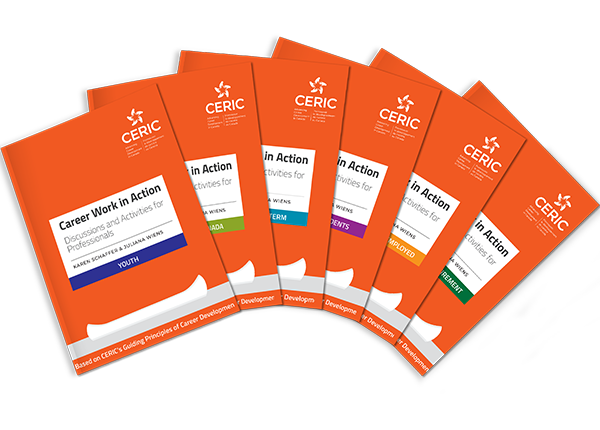
Gamification for career development? CERIC’s new literature search explores the impact of interactive play on learning
November 13, 2019Celebrating the one year anniversary of CareerWise
November 27, 2019CERIC has published a series of six Action Plans for professionals working with different client groups that provide practical discussions and activities based on the Guiding Principles of Career Development. Called Career Work in Action, the plans are authored by Karen Schaffer and Juliana Wiens, career counsellors based at Saint Mary’s University in Halifax.
The purpose of the Action Plans is to provide professionals with insights and ideas for working with clients that align with CERIC’s popular Guiding Principles of Career Development, designed as a colourful and engaging infographic. With a goal of bringing greater clarity and consistency to our national conversations about career development, CERIC launched the Guiding Principles during Canada Career Month in November 2016. Since that time, CERIC has worked to disseminate the Guiding Principles and develop resources and tools to support their application, culminating with the new Action Plans.
Action Plans cover the following client populations:
- Youth: High school students, primarily in Grades 10-12, who are having to make career/ education-related decisions. These students may be engaged, highly engaged or disengaged
- Post-Secondary Students: Students between the ages of 18-25, who come to post-secondary either directly from high school or after a short gap period. Many points also apply to mature students
- Educated and Underemployed: Often recent graduates trying to find work in their field or move beyond entry-level roles but also includes workers who are precariously employed and mothers returning to work
- Unemployed Long Term: Mature adults who have been unemployed for one year or more and who want to work. Unemployment could result from struggles with illness, time spent caregiving or a prolonged, unsuccessful job search
- Newcomers to Canada: Adults who have come to Canada in order to re-establish themselves. Some will have chosen to immigrate in order to access opportunities, while others will have had to flee unrest or unsafe conditions
- Transitioning to Retirement: Those between the ages of 55-67 who have fairly uninterrupted work histories. These individuals are most often middle to upper class, though it is acknowledged others in this age group do not have the luxury of retirement
Each Action Plan begins with situating the client population within the Guiding Principles to identify where their complexities and challenges lie, and then suggests discussion questions and activities that professionals can use when providing career support. The intended users of the plan are a broad spectrum of professionals – both inside and outside of the career development field – who may provide career-related support to those with whom they work.
With a focus on “How do we help?,” questions and activities in the plans are grouped around five key areas of career work, according to an Organic Career Support Framework presented by the authors. Suggested discussions and activities provide relevant conversational starting points, opening questions, concrete interventions and fun activities for each of the key areas of career support. The five key areas are:
Self-exploration – Helping clients figure out who they are and what they want
Decision-making – Supporting clients at key points of decision-making
Support through transition – Encouraging, coaching, supporting, advising through transition
Future thinking – Helping clients think ahead, anticipate future challenges and strategize around how to respond
Mental health – Providing support around mental health and well-being issues as they relate to career
Earlier this year, CERIC released a companion document to the Guiding Principles that outlines a selection of the extensive research that underpins them. Guiding Principles of Career Development: Anchored by Evidence lists expert quotes and references from a cross-section of journals and reports that illustrate the Principles’ currency, relevance and validity. The resource provides stakeholders with the theoretical grounding behind the Principles.
Action Plan authors Schaffer and Wiens will be presenting a session at the Cannexus National Career Development Conference on January 28, 2020 titled “An Experiential Journey Through the CERIC Guiding Principles.” The session will delve into how the Action Plans translate Guiding Principles into practical client interventions. This is a chance to experience the Guiding Principles as a reflective tool for professionals and learn new action strategies together with colleagues.
Download the Action Plans for free at ceric.ca/principles. A limited print run will be available for purchase at Cannexus for $10/copy.

